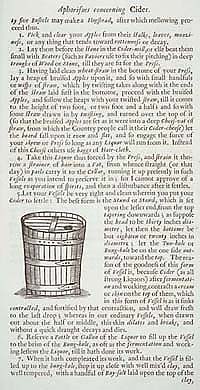Evelyn’s Sylva was a collaborative work, written at the request of the Commissioners of the Navy, and
undertaken by a number of Fellows of the fledgling Royal Society (founded in 1660), following a paper
that Evelyn had given to the Society on 15th October, 1662. Perhaps the most successful of the
various projects which Evelyn directed on behalf of the Royal Society, Sylva was later expanded in its
second and third editions, and represented a major part of the Society’s claim to have achieved
progress in practical matters. It was not a wholly original work, building as it did on the writings
of Interregnum improvers like Blith and Austen (see catalogue nos.15 and 14 ), who had also been
concerned with the danger of a timber famine and with the best means for its remedy.
Among those who contributed to Evelyn’s volume was John Beale (1608–83),
rector of Yeovil, Somerset, who had been one of Samuel Hartlib’s most frequent correspondents during
the 1650s. In 1657, Hartlib had published Beale’s Herefordshire Orchards, which described the
cultivation of apple and pear orchards, and extolled the virtues of cider and perry. Beale argued
that the planting of orchards would promote trade and industry, without which the word of God was ‘at
the best … a pleasant song’, and suggested that, in the groves of the orchard, ‘we approach the
resemblance of Paradise, which God with his own perfect hand had appropriated for the delight of his
innocent Master piece’ (Herefordshire
Orchards, pp.39 & 48). From 1662, Beale had been
encouraging the Royal Society to undertake a campaign to promote the growing of cider apples
throughout England.
The appendix to Evelyn’s discourse of forest trees in Sylva, entitled
Pomona, was
largely contributed by Beale, although it was polished and ordered by Evelyn prior to publication.
Pomona gave
advice on the cultivation and management of orchards, and the production of cider. In it, Beale
particularly extolled the virtues of redstreak cider, a liquor resembling white wine, and argued for
the medicinal benefits of cider consumption. He also defended his choice of fruit for cider making
against criticisms raised by Austen. Other Herefordshire cidermen whose writings contributed to
Pomona
included Captain Taylor, whose settling vessel for the drink is illustrated overleaf.
Sylva and Pomona continued the debates about the best way to manage forests and orchards for the
good of the state and the profit and health of individuals, which had begun in the 1650s. Beale’s
contributions reflected his belief that real improvement could only come about through a return to
ancient practices, of which the oldest was the cultivation of fruit trees in orchards and groves.
Evelyn’s ‘Historical account of the sacredness and use of standing groves’, added to later editions
of Sylva,
in 1670 and 1679, to some extent shared Beale’s preoccupation with the recreation of Eden in this
way, as did Abraham Cowley’s poem, ‘The Garden’, which was printed in the third edition.




